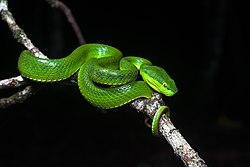Top Qs
Timeline
Chat
Perspective
Trimeresurus
Genus of snakes From Wikipedia, the free encyclopedia
Remove ads
Trimeresurus is a genus of pit vipers native to Asia. They are found from the Indian subcontinent throughout Southeast Asia, China, and the Pacific Islands. The genus currently contains 44 recognized species.[2] Common names include Asian palm pit vipers,[3] Asian lanceheads, and green pit vipers.[4]
Remove ads
Description
Most species in the genus Trimeresurus are relatively small, primarily arboreal species, with thin bodies and prehensile tails. Most Trimeresurus species are typically green in color, but some species also have yellow, black, orange, red, or gold markings.
Feeding
The diet of Trimeresurus species includes a variety of animals, including lizards, amphibians, birds, rodents, and other small mammals.
Reproduction
Like most viper species, many of the species in the genus Trimeresurus are ovoviviparous, bearing live young. However, some species such as T. macrolepis and T. hageni are oviparous, laying eggs. Also, the reproductive biology of some Trimeresurus species is as yet unknown.
Venom
Trimeresurus venom varies in toxicity between species, but all are primarily hemotoxic and considered to be medically significant to humans.
Geographic range
Species in the genus Trimeresurus are found in Southeast Asia from India (including regions of the North Chotanagpur division of Jharkhand) to Southern China, Taiwan, and Japan, and the Malay Archipelago to Timor.[1]
Species
*) Not including the nominate subspecies.
T) Type species.[1]
Remove ads
Taxonomy
Summarize
Perspective
Additional species that may be recognized by other sources include:[11]
- T. barati Regenass & Kramer, 1981. Commonly called Barat's bamboo viper, found in Indonesia.
- T. fucatus Vogel, David & Pauwels, 2004. Commonly called the Siamese peninsula pit viper and found in southern Thailand, Myanmar, Malaysia.
The genus Trimeresurus (sensu lato) has been the subject of considerable taxonomic work since 2000, resulting in the recognition of additional genera within this complex. Most authors now recognise the genus Protobothrops for the species cornutus, flavoviridis, jerdonii, kaulbacki, mucrosquamatus, tokarensis, xiangchengensis,[12][13][14] since these have been shown not to be closely related to other Trimeresurus in recent phylogenetic analyses.
In addition, Malhotra and Thorpe (2004)[13] proposed a radical shake up of the entire genus, splitting Trimeresurus into seven genera. Their proposed arrangement (including species described since 2004) is shown in the table below:
This new arrangement has been followed by many,[14][15] but not all[11][16] subsequent authors.
David et al. (2011) considered some of the genera of Malhotra & Thorpe to be subgenera of the genus Trimeresurus, creating new combinations such as "Trimeresurus (Parias) flavomaculatus", "Trimeresurus (Popeia) popeiorum", "Trimeresurus (Viridovipera) stejnegeri", etc.[17]
Remove ads
Gallery
- A juvenile T. vogeli in Khao Yai National Park, Thailand
- Trimeresurus fucatus from Khao Sok National Park, Thailand
- Trimeresurus albolabris from Kaeng Krachan National Park, Thailand
- Trimeresurus gumprechti, Gumprecht's green pit viper, from Phu Hin Rong Kla National Park, Thailand
- Trimeresurus macrops from Khao Yai National Park, Thailand
- Trimeresurus popeiorum from Kaeng Krachan National Park, Thailand
Remove ads
See also
References
Further reading
Wikiwand - on
Seamless Wikipedia browsing. On steroids.
Remove ads




































